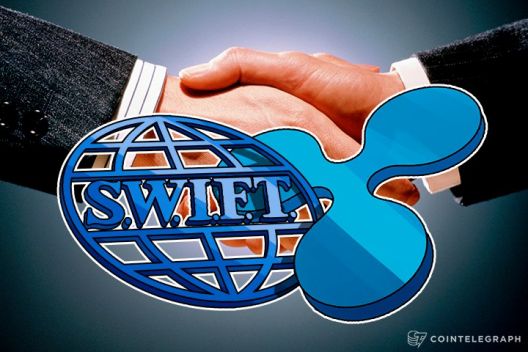Major Banks Launch Global Payments Steering Group – Group members unite to create the first rules-based blockchain payments network

PSD2 Facts: No more home country shopping?
September 26, 2016
What Happened to the Financial Blockchain Revolution?
December 16, 2016Major Banks Launch Global Payments Steering Group – Group members unite to create the first rules-based blockchain payments network
SAN FRANCISCO–(BUSINESS WIRE)–Ripple, the global provider of financial settlement solutions, today announced that a number of global banks are joining forces to establish the first interbank group for global payments based on distributed financial technology. Bank of America Merrill Lynch, Santander, UniCredit, Standard Chartered, Westpac Banking Corporation, and Royal Bank of Canada are the founding members of the organization, known as the Global Payments Steering Group (GPSG).
“We are committed to delivering innovations that support the evolution of global payments networks. We are pleased to join this steering group and explore practical applications for blockchain technology that will advance commerce in all regions of the world.”
The GPSG will oversee the creation and maintenance of Ripple payment transaction rules, formalized standards for activity using Ripple, and other actions to support the implementation of Ripple payment capabilities. CIBC will also join the GPSG as a new member.
“The creation of GPSG is significant because this represents the first time that major banks have formulated policies to govern the transfer of money across borders using blockchain,” said Donald Donahue, Chairman of GPSG and former President & CEO of The Depository Trust & Clearing Corporation (DTCC). “I’m very excited to be a part of this group of forward-looking leaders who are building the payments network of the future today.”
These leading banks are working with Ripple in an effort to drastically reduce the time and cost of settlement while enabling new types of high-volume, low-value global transactions. By coming together to form the GPSG, they are laying the foundation for a modern payments network underpinned by Ripple’s solutions and supported by rules and governance for global settlement.
“Today, people expect money to move at the speed of the Internet. That’s why we’re working with these top banks to address the need for faster cross-border payments,” said Ripple CEO and co-founder Chris Larsen. “The work of GPSG, a new global interbank network, will give financial institutions and their customers the ability to make new types of payments at mass scale.”
Several of the banks commented about their decision to launch the network:
Jason Tiede, Head of Innovation, Global Transaction Services at Bank of America Merrill Lynch said, “We are committed to delivering innovations that support the evolution of global payments networks. We are pleased to join this steering group and explore practical applications for blockchain technology that will advance commerce in all regions of the world.”
Julio Faura, Head of R&D at Santander said: “It’s time for banks to push on and move from discussing the potential benefits of blockchain, to making them a reality. As ever, the devil is in the details. We are joining the GPSG in order to contribute to the definition of the standards and processes which the industry now needs in order to move ahead and build better payments networks.”
Carolyn Burke, Head, Regulatory Payments, RBC said: “As a leading Canadian player in the global payments ecosystem, RBC is at the forefront of developing payment technology that provides greater choice, security and options for its clients.”
Gautam Jain, Global Head, Digitisation and Client Access, Transaction Banking, Standard Chartered said, “As a leading international bank committed to digitization, our involvement in this group is only natural. In addition to promoting the use of distributed ledger technology, we have been, and will continue to, drive standards and policies in order to create new value propositions for our clients and wider industry.”
Mike Baldwin, Head of Transactional Solutions, Global Transactional Services at Westpac Institutional Bank said: “A common set of standards and protocols is critical for the integrity of any platform that transfers money across borders. This is an important milestone for banks to embrace distributed ledgers in the move from proof-of-concept to commercial-ready solutions.”
Phil Griffiths, SVP, Global Transaction Banking, CIBC said, “Leading in innovation means recognizing the value of collaboration, and we look forward to bringing that approach to this important effort to shape the payments market of tomorrow for our business clients.”
Today, Ripple’s growing, global network includes 15 of the top 50 global banks, 10 banks in commercial deal phases, and over 30 bank pilots completed. To learn more about Ripple’s solutions and relevant use cases for financial institutions, please visit Ripple.com.
About Ripple
Ripple provides global financial settlement solutions to ultimately enable the world to exchange value like it already exchanges information – giving rise to an Internet of Value (IoV). Ripple solutions lower the total cost of settlement by enabling banks to transact directly and with real-time certainty, optionally using the digital asset XRP to further reduce liquidity costs. Banks around the world are partnering with Ripple to improve their cross-border payment offerings, and to join its growing, global network of financial institutions and liquidity providers.
Ripple is a venture-backed startup with offices in San Francisco, New York, London, Sydney and Luxembourg. As an industry advocate for the Internet of Value, Ripple sits on the Federal Reserve’s Faster Payments Task Force Steering Committee and co-chairs the W3C’s Web Payments Working Group.
September 23, 2016
http://www.businesswire.com/news/home/20160923005192/en


